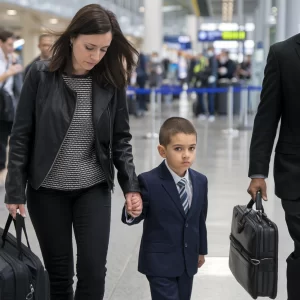 When couples decide to divorce, there are often questions about temporary living arrangements, particularly regarding the children. One of the most common questions is whether one spouse—often the mother—can take the kids to stay with a relative, such as her mother, after filing for divorce. This scenario can raise concerns, especially when both parents want to maintain a close bond with the children during the divorce process. Understanding Oklahoma law regarding temporary relocations can help parents make informed decisions and protect their rights.
When couples decide to divorce, there are often questions about temporary living arrangements, particularly regarding the children. One of the most common questions is whether one spouse—often the mother—can take the kids to stay with a relative, such as her mother, after filing for divorce. This scenario can raise concerns, especially when both parents want to maintain a close bond with the children during the divorce process. Understanding Oklahoma law regarding temporary relocations can help parents make informed decisions and protect their rights.
Oklahoma’s Approach to Parental Rights and Temporary Relocation
In Oklahoma, both parents are generally entitled to equal rights and access to their children. However, divorce creates a temporary period where each parent’s ability to care for the children might fluctuate. The law allows some flexibility for short-term relocations, but certain guidelines must be followed to prevent one parent from unreasonably withholding access to the children. In situations where one parent wants to temporarily stay elsewhere with the children, Oklahoma has specific rules to guide both parents through the process.
Temporary Moves Without Consent
Oklahoma law permits a parent to take the children and temporarily stay with a family member or friend for a certain period of time without needing the other parent’s written consent. Here’s how this rule works:
1. Temporary Relocation Up to 60 Days: Either parent can take the children to stay with a relative or friend for up to 60 days. During this time, the law does not require the other parent’s written consent for the temporary relocation.
2. Out-of-State Temporary Relocation: A parent can take the children outside of Oklahoma without the consent of the other parent for up to two weeks.
3. Notification Requirement: While written consent isn’t necessary for short-term stays, the parent moving with the children must inform the other parent of the temporary relocation. This means sharing details about where they will be staying and who will be with the children during this time.
4. Allowing Contact: During the temporary relocation period, the moving parent should ensure reasonable access to the children through phone calls, video chats, or similar forms of contact. Unless there is a claim of abuse, preventing the other parent from contacting the children is not permitted.
If a parent fails to follow these guidelines and withholds information about the children’s location or restricts contact without a valid reason, it could lead to legal repercussions. Open communication about the children’s whereabouts during this period is essential.
Temporary Relocation Beyond Allowed Limits
If the temporary relocation extends beyond the legally allowed amount of time, the situation changes. This means beyond 60 days if relocation is still in Oklahoma and beyond two weeks if relocation is out of the state jurisdiction. According to Oklahoma law, after the legally allowed time, the moving parent needs written consent from the other parent to continue staying away with the children. This rule is designed to protect each parent’s right to be involved in the children’s lives and prevent one parent from making unilateral decisions about living arrangements for extended periods.
Granting or Withholding Consent for Extended Stays
When one parent requests to stay away longer than the legally allowed amount of time with the children, the law expects that neither parent will “unreasonably withhold” consent. This means that, in most cases, if there are no legitimate concerns, the other parent should agree to the extended stay. However, there are cases where it may be reasonable to deny consent. Here are examples of when consent might be reasonably granted or withheld:
- Reasonable Request: If the mother asks to stay an extra week with the children at her mother’s house for a family event, the father might consider this a reasonable request and grant consent.
- Reasonable Denial: If there’s reason to believe the mother may not return or has intentions of permanently moving the children without a court-approved custody arrangement, the father could reasonably deny the request.
Concern About Withholding or Absconding with the Children
One of the greatest fears for parents during divorce is the possibility that the other parent may try to take the children away permanently. Oklahoma law includes measures to prevent one parent from hiding the children or refusing to communicate their location. Here’s what to consider if you’re worried about the other parent withholding or absconding with the children:
1. Communicate Directly: If you’re concerned about the length of the stay, communicate directly with the other parent to clarify their plans. Sometimes open communication can ease concerns or clear up misunderstandings.
2. Seek Legal Help: If the other parent is not being transparent or you believe they might not return, contact a Tulsa child custody attorney. An Oklahoma family attorney can help you file for temporary custody orders if necessary, securing your parental rights and the children’s stability.
3. File for Temporary Custody: In some cases, filing for temporary custody can clarify parental rights and prevent one parent from leaving with the children indefinitely. The court can issue temporary orders to outline each parent’s visitation and custody rights while the divorce process unfolds.
4. Attend a Court Hearing: If there’s a significant fear that the other parent intends to relocate permanently with the children, requesting a court hearing can bring the matter before a judge. Temporary orders from the judge can outline clear conditions for both parents regarding the children’s living arrangements and ensure both parties abide by them.
What to Expect in Court in Tulsa, OK
If communication fails or there’s a legitimate concern that the other parent may abscond with the children, the court can issue temporary orders to protect each parent’s rights. Temporary orders provide guidelines for custody and visitation, ensuring the children have stable living arrangements and both parents maintain access. Here’s what the court may consider when issuing temporary orders:
- Parental Cooperation: Courts look favorably on parents who attempt to work cooperatively, especially when it involves ensuring the children’s well-being.
- Best Interests of the Children: The judge will consider the children’s best interests, including factors like school stability, emotional needs, and relationships with both parents.
- Claims of Abuse or Neglect: If one parent raises allegations of abuse or neglect, the court will evaluate these claims and make decisions that prioritize the children’s safety. In cases where abuse is alleged, contact may be temporarily restricted until further review.
Steps to Protect Your Rights During Temporary Relocations
Whether you’re concerned about the other parent taking the children or need to relocate temporarily yourself, it’s important to know your rights. Here are some strategies for protecting those rights and maintaining stability for the children:
- Document Communication: Keep a record of conversations and written exchanges with the other parent about the temporary relocation. This documentation can be useful if there are disputes.
- Inform the Court Early: If you’re moving temporarily and taking the children, inform the court early on to show transparency and prevent misunderstandings.
- Follow Court Orders: If temporary orders are in place, follow them precisely to avoid conflicts with the other parent. Courts take compliance seriously and favor parents who prioritize their children’s needs.
Communication and Cooperation Are Key
Divorce is a challenging process for any family, and temporary relocations can add to the complexities. By following Oklahoma’s guidelines, parents can help ensure a fair arrangement that respects both parties’ rights. Remember that open communication, mutual respect, and legal guidance can be valuable in making sure both parents stay involved in their children’s lives during and after divorce.
Hire a Tulsa Dad’s Law Child Custody Attorney
If you have further questions or concerns about your parental rights or specific situations involving temporary relocations, it’s wise to consult a Tulsa child custody attorney. A Tulsa family law attorney can help you understand Oklahoma’s guidelines, protect your rights, and support you in navigating the complexities of divorce while keeping your children’s best interests at heart. Contact Dad’s Law now and consult with one of our child custody lawyers. Call (918) 962-0900.




